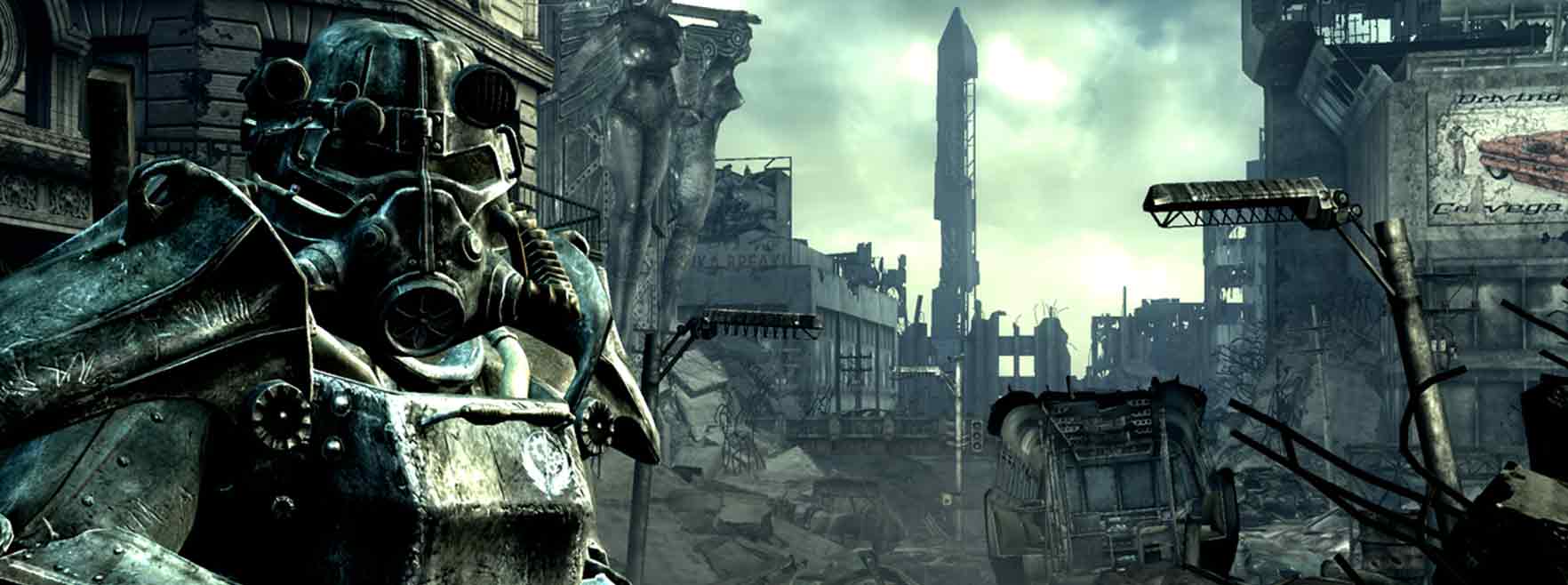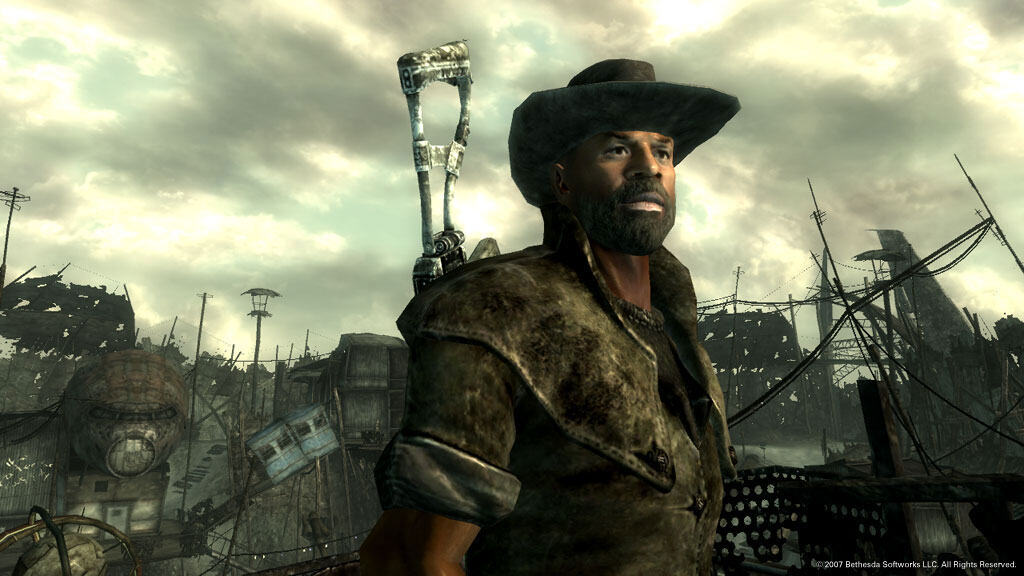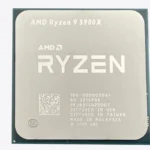The nuclear wasteland may soon get a fresh coat of irradiated paint. Following the successful launch of The Elder Scrolls IV: Oblivion Remastered in April 2025, new reports suggest that Bethesda and Microsoft are preparing a remaster of Fallout 3. However, despite the mounting excitement, insiders caution that the wait may still be long—possibly stretching into 2026 or beyond.
Fallout 3 Remaster: What We Know So Far

A Leak With Fallout-Sized Implications
The existence of the Fallout 3 Remaster was first hinted at in internal Microsoft planning documents leaked during the FTC v. Microsoft legal proceedings in 2023. These same documents also revealed plans for an Oblivion remaster—which has since materialized—lending credibility to the idea that Fallout 3 is next in line.
Originally listed with a targeted release window of 2024, more recent reports suggest the remaster is still deep in development. Sources close to the project have stated that it is progressing slower than expected, which means a 2026 release now seems more likely. A strategic launch around the second season of Amazon’s Fallout TV series could give it a major marketing boost, potentially drawing in both longtime fans and newcomers alike.
Expected Upgrades and Features
While Bethesda has not made any official announcements, the success and scope of Oblivion Remastered set a strong precedent for what fans can expect from Fallout 3 Remastered. If it follows suit, here’s what could be on the table:
- Complete Visual Overhaul: Expect modernized lighting, texture work, and atmospheric effects—potentially leveraging Unreal Engine 5 or a significantly upgraded Creation Engine.
- Overhauled Gunplay: The original Fallout 3 received criticism for clunky first-person shooting. A remaster would likely refine combat to match today’s standards, possibly adopting improvements seen in Fallout 4.
- Updated Animations and Models: From facial expressions to creature behavior, animations would be brought in line with current-gen expectations.
- Full DLC Integration: All five expansions—Operation: Anchorage, The Pitt, Broken Steel, Point Lookout, and Mothership Zeta—are expected to be included in one package.
- Improved UI & Accessibility: Bethesda has recently emphasized accessibility features, so revamped menus, subtitles, colorblind modes, and control customization could all be part of the release.
Why Now? The Fallout Franchise Is Hot Again
Interest in the Fallout brand is at a high not seen since Fallout 4’s 2015 release. Amazon Prime Video’s Fallout TV series has rejuvenated interest in the series globally, bringing a new wave of players to Fallout 76 and older titles. The remastered Oblivion saw over 4 million downloads in its first three days, indicating there’s huge demand for modern versions of classic Bethesda titles. Leveraging this momentum, a Fallout 3 remaster seems not just logical—but inevitable.
Oblivion Remastered Sets the Tone
Released in April 2025 and developed in partnership with Virtuos, Oblivion Remastered gave fans a modernized version of the 2006 classic. Built using Unreal Engine 5, it features dynamic lighting, 4K textures, and refined AI systems while maintaining the original game’s spirit. Its commercial and critical success likely paved the way for future remasters in Bethesda’s catalog—including Fallout 3.
The approach to Oblivion shows Bethesda is willing to do more than just up-res textures; they’re embracing full overhauls that feel native to modern hardware like the Xbox Series X|S and current-gen PCs. If Fallout 3 receives similar treatment, it could reintroduce the Capitol Wasteland with a level of detail and immersion that the original engine could never achieve.
When Will Fallout 3 Remastered Be Released?
That’s the big question—and the answer is still up in the air. While leaks suggest it’s in development, no official timeline has been announced. Based on industry chatter, a 2026 release aligned with Season 2 of the Fallout show would be a smart move, but nothing is set in stone.
In the meantime, Bethesda is also believed to be working on the long-awaited The Elder Scrolls VI and expanding its lineup of Game Pass-exclusive content. That means a Fallout 3 Remaster might not be top priority—but it’s very much on the roadmap.
With so much momentum behind Bethesda’s remastered efforts, Fallout 3 Remastered feels like a matter of “when,” not “if.” The only question now is: how long are you willing to wait to return to the ruins of Washington D.C.?
Best Fallout Games
The Fallout series has grown into one of gaming’s most beloved franchises, offering players post-apocalyptic adventures across various titles. With its unique blend of retro-futuristic aesthetics and role-playing elements, each game brings something different to the table. Fallout New Vegas is generally considered the best Fallout game due to its exceptional storytelling, meaningful choices, and rich world-building.
Players new to the series often wonder where to begin their journey through the wasteland. The answer isn’t always straightforward, as each game has its own strengths. Some offer better combat mechanics, while others excel in quest design or character development. The good news is that most Fallout games can be enjoyed independently, making it possible to start with any title that catches your interest.
1. Fallout: New Vegas
Fallout: New Vegas stands as a fan favorite in the Fallout series. Released as a spin-off rather than a direct sequel, it nearly became just an expansion pack for Fallout 3, as noted by PC Gamer.
The game excels in its dialogue system and role-playing elements. Players can tackle quests through multiple approaches, with solutions that aren’t always obvious at first glance. This flexibility lets gamers truly shape their experience based on personal play style.
New Vegas offers stronger story branches with genuine consequences for player actions. These choices affect how NPCs and factions respond to the player throughout the game, creating a more dynamic world.
The game takes place in post-apocalyptic Nevada, centered around the remnants of Las Vegas. This setting provides a distinct atmosphere compared to the Capital Wasteland of Fallout 3.
Many fans consider New Vegas the best in the series because it successfully combines modern gameplay with the rich storytelling aspects of earlier Fallout titles. The game maintains many traditional Fallout elements while adapting them to a 3D environment.
Combat in New Vegas improved upon previous iterations with the addition of iron sights and a more nuanced companion system. These features added depth to gameplay without sacrificing accessibility.
The faction system remains one of New Vegas’s strongest features. Players can align with various groups including the NCR, Caesar’s Legion, or Mr. House—or choose to forge their own independent path through the Mojave.
New Vegas also reflects player choices through dialogue more effectively than other entries in the series. This creates a more personalized experience where players feel their decisions matter.
2. Fallout 3
Fallout 3 marks a significant turning point for the series. Released in 2008, it transformed the franchise from an isometric RPG to a first-person 3D experience. This change brought the post-apocalyptic wasteland to life in ways previously impossible.
The game embodies what a Fallout is – a destroyed wasteland ravaged by war, complemented by great 50’s music. The Capital Wasteland remains one of the most atmospheric settings in the series, with its crumbling monuments and dangerous terrain.
Many fans appreciate Fallout 3 for its classic Brotherhood of Steel versus Enclave storyline. The main quest sends players on a journey to find their father while becoming entangled in larger factions and conflicts.
The game features amazing DLC content, from the alien encounter in Mothership Zeta to the moral dilemmas of The Pitt. These expansions add variety and depth to an already substantial game.
Fallout 3’s coherent tone sets it apart from other entries in the series. The bleak, serious atmosphere creates a consistent experience that some players prefer over the more varied tones of later games.
Despite not always being considered one of the best Fallout games, it maintains a dedicated fanbase. The role-playing elements might not match the depth of the classics, but the immersive world compensates for this limitation.
The VATS combat system introduced in Fallout 3 became a signature feature of modern Fallout games. This hybrid of real-time and turn-based combat gives players tactical options while maintaining action elements.
The game’s exploration rewards curiosity with hidden locations, unique weapons, and memorable characters. Each destroyed building potentially contains a story or valuable loot, encouraging thorough investigation of the wasteland.
3. Fallout 4
Fallout 4 brings several improvements to the franchise that many players appreciate. The game features great gunplay and movement mechanics that feel more polished than earlier titles.
The Commonwealth wasteland offers a diverse and interesting map to explore. Players can wander through destroyed urban landscapes, eerie swamps, and radiation-scarred wilderness areas. Each location tells its own story through environmental details.
The companion system stands out as a high point. Characters like Nick Valentine and Piper Wright have distinct personalities and personal quests that add depth to the game world. These companions react to player choices, creating a more immersive experience.
Base building adds a new dimension to gameplay. Players can construct settlements throughout the Commonwealth, providing a sense of rebuilding civilization that wasn’t present in earlier games. This feature allows for creative expression beyond the main storyline.
While some fans criticize the streamlined dialogue system, Fallout 4 compensates with strong side stories that add richness to the world. Quests like “The Silver Shroud” showcase the game’s ability to blend humor with post-apocalyptic themes.
The game also features a robust crafting system. Players can modify weapons, armor, and even power armor to suit their playstyle, adding meaningful customization options.
For modern players, Fallout 4 might be the best choice to play today. Its graphics hold up better than older titles, and its mechanics feel less dated. The game strikes a balance between accessibility and depth.
Some dedicated fans consider it the best in the series, though opinions vary widely across the community. The game ranks highly on most lists of Fallout titles, typically in the top three.
4. Fallout 2
Fallout 2 stands as a legendary title in the post-apocalyptic RPG genre. Released as a sequel to the original game, it expanded on its predecessor in nearly every way. Many fans consider it one of the best, if not the best in the franchise.
The game puts players in the role of “The Chosen One,” a tribal descendant of the original game’s protagonist. Set 80 years after the first Fallout, it features a larger world with more complex settlements and factions to interact with.
What sets Fallout 2 apart is its depth of choice and consequence. Players can solve quests in multiple ways – through violence, stealth, diplomacy, or clever problem-solving. This freedom became a hallmark that later Fallout games tried to recapture.
The writing in Fallout 2 balances dark themes with sharp humor. It tackles serious topics like slavery and corruption while maintaining the series’ trademark wit. This blend creates a unique tone that many fans cherish.
Fallout 2 also supersedes the original in scope and gameplay variety. Its towns feel more alive and memorable, with distinct personalities and problems. From the criminal-run New Reno to the tribal Arroyo, each location tells its own story.
Combat received improvements too, with more weapons, tactics, and companion options. The additions of the car for travel and expanded perks gave players more gameplay choices than before.
While some critics point out that Fallout 2 can feel boring to modern players, those who appreciate classic RPGs often rank it highly. Its influence extends beyond the Fallout series to many modern RPGs.
According to GamesRadar’s ranking, Fallout 2 places 4th among all Fallout games, showing its lasting impact even against newer entries with modern graphics and gameplay.
5. Fallout 76
Fallout 76 stands as the most controversial entry in the Fallout series. Released in 2018, it broke from tradition by focusing on multiplayer gameplay in a shared world rather than the single-player experience fans had come to expect.
At launch, the game faced harsh criticism for technical issues and a perceived lack of content. Many players found the West Virginia wasteland empty without human NPCs to interact with, making the world feel lifeless compared to previous games.
Bethesda has made significant improvements since release. The Wastelanders update added human NPCs and dialogue choices, bringing back some traditional Fallout elements that fans missed. These changes helped transform the experience.
Some players now consider it among their favorites. One Reddit user even claims it’s the best Fallout game, praising its balance between “choices, fun and challenge.” They feel it offers the most complete Fallout experience.
The game shines in its environmental storytelling and map design. Appalachia features diverse regions with unique ecosystems and landmarks, giving players plenty to explore. The multiplayer aspect allows for team-based activities like fighting the Scorchbeast Queen.
Building settlements (C.A.M.P.s) gives players creative freedom absent in other titles. The crafting system remains robust, allowing for weapon customization and resource management.
Despite improvements, Fallout 76 ranks lowest on many lists of Fallout games. Critics point to its departure from series strengths like deep role-playing and impactful narrative choices.
For newcomers, Fallout 76 might not be the best starting point. Other titles in the series deliver stronger story experiences and better introduce players to the Fallout universe.
6. Fallout
The original Fallout game launched in 1997 and set the foundation for the entire post-apocalyptic series. This isometric RPG introduced players to the wasteland setting that would become iconic in gaming culture.
Fallout features a turn-based combat system that rewards tactical thinking. Players use action points to move, attack, and interact with the environment, adding a strategic layer to every encounter.
The game’s story begins with your character leaving Vault 13 to find a water chip, a seemingly simple quest that opens up into a much larger adventure. This setup established the series’ pattern of starting small before revealing bigger threats.
What makes the original Fallout special is its unprecedented level of player choice. The game allows multiple solutions to most problems – you can talk, sneak, or fight your way through situations depending on how you build your character.
The S.P.E.C.I.A.L. stat system introduced here became a hallmark of the franchise. Strength, Perception, Endurance, Charisma, Intelligence, Agility, and Luck determine your character’s capabilities and unlock different dialog options.
Fallout’s dark humor and moral ambiguity still hold up today. The game doesn’t shy away from difficult topics, but presents them with a satirical edge that makes the wasteland feel both dangerous and oddly charming.
The music and sound design create an atmosphere of desolation mixed with retro-futuristic optimism. The haunting ambient tracks perfectly match the ruined world you explore.
While newer Fallout games offer more modern graphics and gameplay mechanics, many fans rank the original highly for its storytelling depth and true role-playing elements. It laid the groundwork for what would become one of gaming’s most beloved franchises.
7. Fallout Shelter
Fallout Shelter stands apart from other games in the series as a mobile-focused base-building simulator. Released by Bethesda in 2015, this free-to-play game puts players in charge of their own Vault as the Overseer.
Unlike the main Fallout titles, Shelter focuses on resource management rather than exploration. Players must balance power, food, and water while keeping their dwellers happy and protected from dangers like radroaches and raider attacks.
The game uses a charming cartoon art style that captures the Fallout aesthetic in a more approachable way. Characters appear as bobblehead-style figures with the signature Vault-Tec blue and yellow color scheme throughout.
One of Shelter’s strengths is its well-placed advertisements that don’t interrupt gameplay. This design choice makes sense given Bethesda’s financial stability compared to smaller developers.
The quest system adds depth to what could otherwise be a simple resource game. These missions allow dwellers to venture outside the vault, giving players a taste of the wasteland exploration the series is known for.
While Fallout Shelter may not offer the narrative depth of New Vegas or Fallout 3, it successfully brings the franchise to a new format. The game has been praised by fans for its ability to capture the Fallout spirit while creating an entirely different gameplay experience.
The simplicity of Shelter makes it accessible to newcomers while offering enough Fallout lore references to please longtime fans. Its success showed that the Fallout universe could extend beyond traditional RPGs.
Despite being a mobile game, Shelter eventually made its way to consoles and PC, cementing its place in the franchise lineup. It may not be the most complex entry, but it delivers solid entertainment value as a management sim.
8. Fallout Tactics: Brotherhood of Steel
Fallout Tactics takes a different approach from the main series. It focuses on turn-based tactical combat rather than the RPG elements fans expect. The game puts players in control of a Brotherhood of Steel squad in the Midwest region.
Unlike other Fallout games, Tactics limits free exploration. Players move through missions in a more linear fashion. This change disappointed some hardcore Fallout fans who loved the open-world feel of earlier games.
Combat shines as the strongest element. The game gives players deep tactical options and strategic gameplay that many enjoyed. You can command your squad using real-time or turn-based modes, offering flexibility for different play styles.
The story follows a Brotherhood of Steel chapter that broke away from the main group. Their mission to secure technology takes them through the post-nuclear Midwest. While not as rich as main Fallout game narratives, it does expand the Brotherhood lore.
Characters lack the depth found in other Fallout titles. Your squad members have limited personality, serving mainly as combat units rather than companions with stories.
Some fans consider Tactics an underrated gem. It often gets confused with the poorly-received console game “Fallout: Brotherhood of Steel” – a completely different title that ranks lower on most Fallout lists.
Multiplayer was included but rarely used. The feature let friends battle each other’s Brotherhood squads, though finding opponents proved difficult even when the game was new.
Fallout Tactics sits in the middle ground of Fallout games. While not matching the brilliance of the main series entries, it offered a solid tactical experience with the Fallout flavor. The game ranks better than some spin-offs but can’t compete with the narrative depth of the core games.
9. Fallout 1
Fallout 1 stands as the game that started it all, launching the post-apocalyptic franchise in 1997. Set in a nuclear wasteland of southern California, it introduced players to the retro-futuristic world that would become iconic.
The game’s atmosphere is often praised by fans. Many consider it to have the best atmosphere and most consistent tone in the series. Its bleak, serious mood creates a truly immersive experience.
Character choice matters significantly in Fallout 1. Players can tackle challenges through combat, stealth, or dialogue, with real consequences for their actions. The game respects player intelligence by not marking every solution.
The villain of Fallout 1, The Master, remains one of gaming’s most memorable antagonists. His complex motives and the moral questions surrounding his plans add depth to the storytelling.
Combat uses a turn-based system that rewards strategic thinking. While it might feel dated to modern players, it offers depth through various weapons and tactical options.
The game’s compact size works in its favor. Unlike later titles with massive maps, Fallout 1 delivers a focused experience where each location serves a purpose in the narrative.
Time limits add tension to the main quest. Players must find a water chip for their vault within a set timeframe, creating genuine urgency often missing from modern RPGs.
Voice acting in Fallout 1 is surprisingly strong for its era. The limited but excellent voice cast includes performances that help establish the game’s unique tone.
While not consistently ranked as the absolute best in the series according to critic and user reviews, Fallout 1 remains brutally good and essential for understanding the franchise’s roots.
10. Fallout: Brotherhood of Steel
Fallout: Brotherhood of Steel stands as the black sheep of the Fallout family. Released for PlayStation 2 and Xbox in 2004, this action-focused spin-off marked a significant departure from the series’ roots.
Unlike its RPG siblings, Brotherhood of Steel adopted a linear hack-and-slash approach. Players could choose from three characters and fight through hordes of enemies in a top-down view reminiscent of games like Baldur’s Gate: Dark Alliance.
The game ranks consistently at the bottom of most Fallout lists. According to Den of Geek, it sits dead last among all Fallout titles, while XboxEra places it at #8 in their ranking.
Despite the negative reception, some players found enjoyment in the game. One GameFAQs user mentioned that “the game isn’t that bad” if approached with appropriate expectations. They suggested that those who knew it would be similar to Baldur’s Gate: Dark Alliance had fun with it.
The Brotherhood of Steel faction portrayed in this game differs from their representation in other Fallout titles. The original Fallout showed them as technologically focused with clear goals, while this spin-off simplified their character for action gameplay.
The game’s soundtrack also broke tradition by featuring bands like Slipknot and Killswitch Engage instead of the retro-futuristic music typical of the series.
Many fans don’t consider Brotherhood of Steel canon within the Fallout universe. Its commercial failure led Interplay to cancel the planned sequel before Bethesda acquired the franchise rights.
Overview of the Fallout Series
The Fallout series has transformed from a niche isometric RPG into one of gaming’s most recognized franchises. Its post-apocalyptic world combines retrofuturistic aesthetics with dark humor and complex moral choices.
Evolution of Gameplay Mechanics
Fallout began in 1997 with a turn-based combat system and isometric view. The early games emphasized character stats, skills, and perks that truly affected gameplay options. When Bethesda acquired the franchise, Fallout 3 introduced the V.A.T.S. combat system and shifted to first-person perspective.
Each sequel refined these mechanics. Fallout 4 added sprinting and improved gunplay while expanding settlement building. New Vegas kept the core mechanics of Fallout 3 but added iron sights and weapon modifications.
The S.P.E.C.I.A.L. attribute system (Strength, Perception, Endurance, Charisma, Intelligence, Agility, Luck) has remained the backbone of character development throughout the series. This system lets players create unique character builds that affect dialogue options and gameplay approaches.
Impact on the RPG Genre
Fallout’s influence on RPGs has been substantial. The series pioneered meaningful player choice where decisions have lasting consequences on the game world. This approach to branching narratives has become a standard feature in modern RPGs.
The franchise demonstrated that mature themes could be commercially successful in RPGs. Topics like slavery, political corruption, and moral ambiguity are central to Fallout’s identity and storytelling.
Fallout: New Vegas is particularly noted for its dialogue options and faction system. Players can align with various groups, each with distinct ideologies. This reputation system has inspired many RPGs that followed.
The series also popularized open-world exploration in 3D RPGs, letting players ignore the main quest to discover unmarked locations, unique characters, and unexpected stories throughout the wasteland.
Storytelling in Fallout Games
The Fallout series has created some of the most memorable post-apocalyptic narratives in gaming history. Each game approaches storytelling with distinct methods while maintaining the dark humor and moral complexity that defines the franchise.
Narrative Techniques
Fallout games use environmental storytelling to build their worlds. Players discover stories through terminal entries, audio logs, and the physical arrangement of skeletons and objects. This technique creates a sense of discovery that rewards exploration.
Fallout 1 stands out for its focused narrative despite technical limitations. Its straightforward quest to find a water chip evolves into something more sinister, demonstrating how the series balances linear and open storytelling.
New Vegas offers the most branching narrative paths, with four major factions competing for player allegiance. This approach gives players meaningful choices that affect the Mojave Wasteland’s future.
Fallout 3 and 4 use personal motivations as story drivers – finding your father or son respectively. This creates emotional investment but sometimes limits role-playing flexibility.
Character Development
Companion characters provide much of the emotional depth in Fallout games. These NPCs react to player choices, develop over time, and offer unique perspectives on the wasteland.
New Vegas features particularly rich character writing, with companions like Boone and Veronica having layered backgrounds and personal quests that reveal their motivations and values.
Faction leaders serve as ideological mouthpieces for different worldviews. Meeting figures like Caesar, Mr. House, or Elder Maxson challenges players to consider competing visions for rebuilding society.
Player character development varies by game. Earlier titles offered more role-playing freedom, while Fallout 4 introduced a voiced protagonist with a defined backstory. This shift sparked debate about the balance between narrative clarity and player agency.
Frequently Asked Questions
The Fallout series has sparked many debates among fans about which game offers the best experience. Players often compare narrative quality, gameplay mechanics, and mod support when determining their favorites.
Which Fallout game is considered to have the best narrative?
Fallout: New Vegas is widely regarded as having the strongest narrative in the series. The game’s branching storyline allows players to side with multiple factions, each with complex motivations and believable characters.
The writing in New Vegas benefits from the involvement of original Fallout developers who brought their storytelling expertise. Many fans praise how player choices have meaningful consequences throughout the game.
The DLCs for New Vegas, particularly Dead Money and Lonesome Road, further enhance its storytelling reputation with themes of letting go and the consequences of one’s actions.
What is the optimal starting point for newcomers to the Fallout series?
Fallout 3 serves as an excellent entry point for newcomers to the series. It introduces the post-apocalyptic setting with a straightforward main quest that guides players through the core mechanics and themes of the Fallout universe.
The game explains what you’ll be getting into with a gradual introduction to the wasteland. Its more focused narrative makes it easier to follow than some other entries.
Fallout 4 is another good starting option with more modern gameplay and graphics, though some RPG elements are simplified compared to earlier titles.
Which Fallout game offers the most comprehensive modding capabilities?
Fallout 4 provides the most extensive modding framework in the series. The Creation Kit released by Bethesda gives modders powerful tools to alter almost every aspect of the game.
The mod community has created thousands of additions ranging from simple texture improvements to complete overhauls of gameplay systems and new quest lines. Some mods even transform the entire game into different experiences.
Fallout: New Vegas also has a robust modding scene with projects like New California and The Frontier adding entire new game worlds, though the older engine has more technical limitations.
How do fans typically rank the Fallout games in terms of overall experience?
Fans often place Fallout: New Vegas at the top of their rankings due to its strong narrative, role-playing options, and faction system. Many consider it the best in terms of tight design.
Fallout 3 and Fallout 4 typically compete for second place, with 3 praised for its atmosphere and exploration, while 4 gets credit for improved combat and settlement building.
Classic fans often rank Fallout 2 highly for its depth of choice and dark humor, though newer players sometimes find it less accessible due to its isometric view and turn-based combat.
Fallout 76 usually ranks lower due to its rocky launch, though updates have improved the game significantly since release.
What distinguishes Fallout New Vegas from Fallout 4 in terms of gameplay and features?
Fallout New Vegas emphasizes role-playing elements with more dialogue options, skill checks, and multiple ways to complete quests. The game focuses on player agency and how choices affect the Mojave Wasteland.
Fallout 4 features significantly improved combat mechanics, a more detailed crafting system, and the introduction of settlement building. The game streamlines some RPG elements in favor of action gameplay.
New Vegas has a reputation system that tracks your standing with various factions, while Fallout 4 simplifies this to four main factions with more binary relationships.
For players using the PS5, which Fallout game delivers the best performance and graphics?
Fallout 4 delivers the best technical experience on PS5 through backward compatibility. The system’s increased power allows for more stable framerates and faster loading times compared to playing on previous consoles.
While no Fallout games have received specific PS5 enhancements yet, Fallout 4 benefits most from the hardware upgrade. The game runs at a more consistent 30fps with fewer drops during combat or in dense areas.
Players should note that mod support on PlayStation is more limited than on Xbox or PC, which affects how much the visual experience can be improved through community enhancements.







